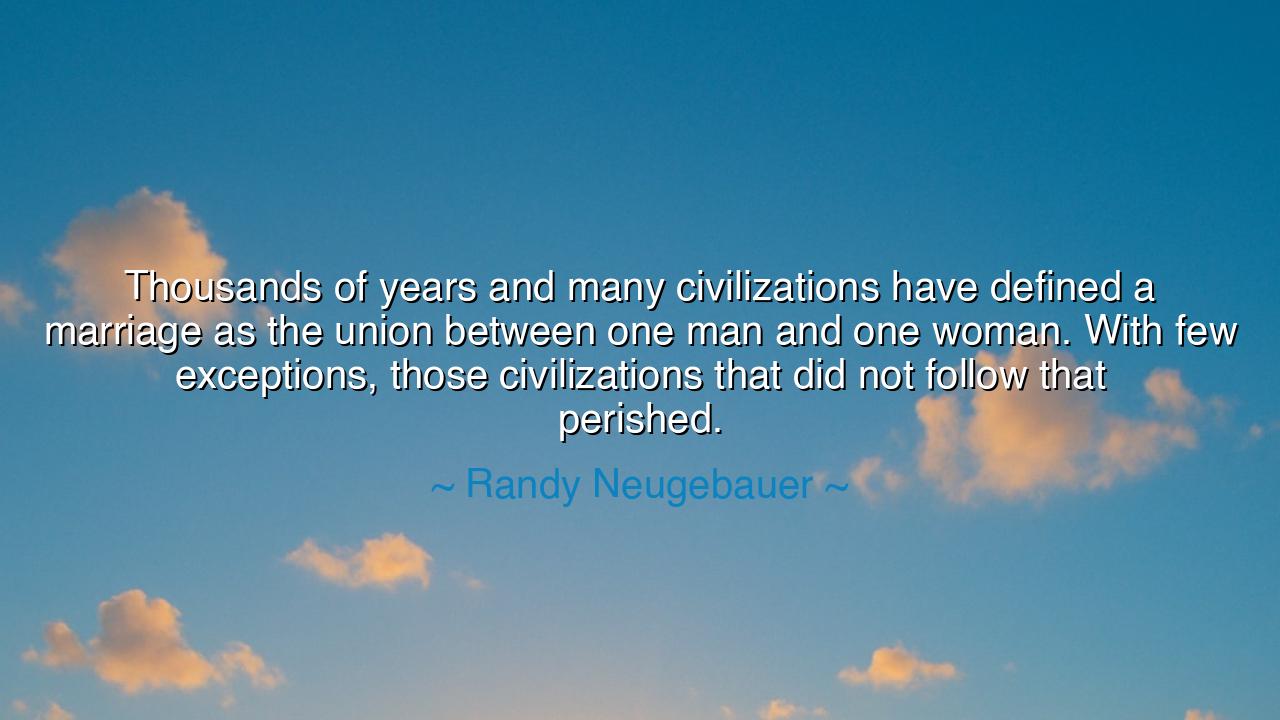
Thousands of years and many civilizations have defined a marriage
Thousands of years and many civilizations have defined a marriage as the union between one man and one woman. With few exceptions, those civilizations that did not follow that perished.






When Randy Neugebauer declared, “Thousands of years and many civilizations have defined a marriage as the union between one man and one woman. With few exceptions, those civilizations that did not follow that perished,” he was not merely offering a definition—he was invoking the memory of history itself, the long and sacred thread that binds generation to generation. His words carry the weight of time, the echo of ancient wisdom that has guided humanity since its dawn: that marriage, in its truest sense, is not only a personal bond, but the cornerstone of civilization. Through it, societies are built, children are nurtured, and the moral order of a people finds its foundation. In this statement, Neugebauer speaks as one who remembers what the modern world too easily forgets—that when the family falters, nations crumble.
The meaning of his words lies in the recognition that marriage is not merely a social contract, but a sacred covenant—an institution older than any government, transcending law and culture. It is a bond through which life renews itself, discipline is learned, and love is given form and duty. From the earliest tribes to the greatest empires, marriage between man and woman has stood as a symbol of balance—the harmony of strength and tenderness, of creation and continuity. When Neugebauer warns that civilizations which stray from this pattern perish, he is not uttering prophecy but observing history. For when societies lose their sense of family, they lose their sense of future. Without roots, even the tallest tree withers.
Throughout history, the rise and fall of civilizations have been intertwined with the strength or decay of their moral and familial foundations. Consider Rome, that mighty empire which once ruled the known world. In its earliest centuries, Roman society was built upon the strength of the household—upon fidelity, discipline, and respect for the sanctity of marriage. The Roman matron was revered, the father held his household with duty, and the family was seen as the smallest yet most sacred cell of the state. Yet as the empire grew rich and indulgent, these virtues waned. Marriage was mocked, fidelity scorned, and the family unit weakened. Historians like Edward Gibbon later noted that Rome fell not only to invading armies but to its own internal rot—the loss of moral order that begins when the family ceases to be sacred.
This truth has been echoed in other civilizations as well. The ancient Israelites, bound by divine covenant, understood marriage as a reflection of their relationship with God—a union demanding faithfulness, sacrifice, and honor. When they held fast to those principles, they prospered, but when they strayed into chaos and moral laxity, destruction soon followed. So too did the Greeks, whose golden age of philosophy and art waned as personal indulgence replaced civic virtue. Again and again, the story is the same: where marriage is strong, the people stand firm; where it is corrupted, the nation decays. Neugebauer’s words, therefore, are not a condemnation of change but a remembrance of cause and consequence.
Yet, beyond its political or moral dimension, there is something profoundly human in his reflection. Marriage, as he defines it, is the joining of two distinct beings into one creative harmony. It mirrors the dual nature of existence itself—the masculine and the feminine, the giver and the nurturer, the form and the spirit. Together they form the vessel through which life, wisdom, and virtue pass from one generation to the next. When that balance is lost, when unity gives way to confusion, humanity forgets its own design. The ancients called this the breaking of the natural order, and they believed it to be among the gravest of sins—not because it offended law, but because it defied life’s very rhythm.
The lesson in Neugebauer’s statement, then, is both moral and practical: to preserve what has preserved us. To remember that freedom without foundation becomes chaos, and progress without wisdom becomes destruction. A society cannot endure on wealth or power alone; it must be rooted in virtue, in family, in the self-discipline that marriage teaches. The love between man and woman, sanctified by loyalty and duty, becomes the first school of citizenship, the first sanctuary of peace. If we wish to build a lasting world, we must rebuild the home—not as a place of mere comfort, but as the forge of character.
So, my child, take these words to heart. Look not only to the grandeur of nations, but to the hearths within them, for there the future is decided. Honor your family. Guard your marriage. Teach your children that love is not desire alone, but commitment, sacrifice, and trust. For every great civilization begins with a man and a woman who choose to build, not for themselves, but for those yet unborn. This is the eternal wisdom that Neugebauer recalls—that when marriage is strong, the light of civilization burns bright; but when it falters, the darkness of forgetfulness soon follows. Hold fast to what is sacred, and the world, through you, shall endure.






AAdministratorAdministrator
Welcome, honored guests. Please leave a comment, we will respond soon